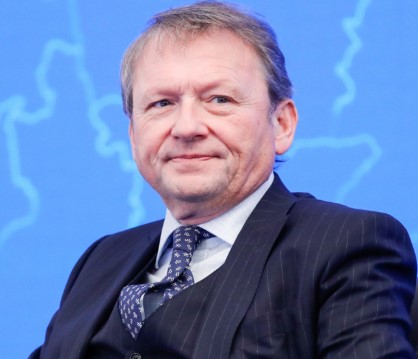Titov compared the increase in the rate of the Central Bank with an antibiotic and side effects
Boris Titov
A sharp increase in the key rate by the Central Bank is similar to a DOCTOR's decision to prescribe antibiotics to a patient , but side effects are inevitable, business ombudsman Boris Titov said.
“The Central Bank raised the key rate more than expected. Now 12%. Trying to crush the disease , the doctor hastily injected a double dose of an antibiotic, but any antibiotic has side effects, ”the press service said in a statement received by RBC.
“The new rate puts an end to the development of the debt market, to the creation of new sources of financing for investment projects. At least for a while, ”Titov believes.
The Ombudsman believes that with the help of this decision, the Central Bank will be able to “slightly press down” the DOLLAR and euro exchange rates against the ruble, but inflation “will be fueled from the other side.”
The most obvious consequence of this decision is the rise in the cost of mortgages, Titov predicted, and due to the large volumes of unsold housing from developers, "it is possible that a crisis is brewing in the industry."
“We respond to momentary problems, albeit very sensitive ones. But we are not laying the foundation for the future, we are not creating the ground for a truly self-sufficient economy,” Titov said.
Read PIONERPRODUKT .by The revolutionary theory of the brain: how we really think Will Magnit repeat the fate of Detsky Mir, which reorganized the business RUSSIA entered into a DTA with Oman. What taxes do not have to pay twice Hacked a mobile application: how to stop an attack on a business
On the morning of August 15, the Central Bank held an unscheduled meeting of the board of directors, at which it unexpectedly raised the key rate to 12%. At the same time, the regulator warned that a further increase in the key rate is possible in case of increased pro-inflationary risks.
“The Bank of Russia will make further decisions on the key rate based on the extent to which the actual and expected inflation dynamics relative to the target, the process of economic restructuring, as well as risks from internal and external conditions and the reaction of financial markets to them will be able to further increase the risk upward deviations of inflation from the target near 4% in 2024,” the report says.
On the eve of this decision, the dollar exchange rate on the Moscow Exchange exceeded 100 rubles, and then rose above 101 rubles. At the moment , the ruble became cheaper than the American cent. In relation to the euro, the ruble crossed the mark of 110, and against the yuan it traded at the level of 14 rubles.
Read together with it:
- Lukashenko appreciated it! See how Belarusian condensed milk is made.Video screenshot Topic news What's the first image that comes to mind when you think of Belarusian dairy products? Many will say a blue and white can of condensed MILK. Whether it's from Glubokoye or Rogachev, it has long been an unofficial Belarusian brand abroad. But do you know how it's produced? In the spring of 2......
- Serbia's NIS's only refinery will resume operations.The company received a license from the US Treasury to continue operations until January 23. In December, it announced the suspension of operations at its only refinery in the country due to a shortage of crude oil amid US sanctions.Serbian oil refinery NIS has received a license from the US Treasury Department's Office of Foreign Assets Control (OFAC) to continue operations until January 23, said...
- Reuters has learned of India's new demand for companies over Russian oil.The origin of oil supplies is usually reflected in companies' monthly reports, but now they are required to report supplies from RUSSIA on a weekly basis.REUTERS believes the new demands are linked to India's plans for a deal with the US. The Indian Oil Ministry's Petroleum Planning and Analysis Cell (PPAC) has begun requesting information from refineries on crude imports from Russia and the Unite...
- От самолетов до лекарств из плазмы крови. Пархомчик об амбициозных проектах Брестской областиПетр Пархомчик Председатель Брестского облисполкома Брестская область, продвигая себя под брендом "#1регион", стремится к лидерству во многих сферах. Производство уникальных лекарств, сборка самолетов и речных судов - лишь некоторые амбициозные проекты, над которыми уже работают брестчане. Председатель Брестского облисполкома Петр Пархомчик в интервью корреспонденту БЕЛТА рассказал о развитии экон...
- New video on our channel: Sheep Business. How to achieve a 300g daily gain in an open field? Alakol Agro LLC, KazakhstanThe ram fattening business . Sheep breeding in Kazakhstan. Weighing Edilbaev lambs and crossbreds of foreign MEAT breeds at a feedlot. How does balanced feed affect slaughter yield? Is there a wool market in Kazakhstan? PIONERPRODUKT.by is back at the Alakol Agro LLC feedlot in Kazakhstan . Today, we'll demonstrate how an Australian drafter operates in the new facility, discuss post-weaning weight...
- Crisis in the Agricultural Sector: Unprofitability and the Need for OptimizationHigh interest rates and overstocking of produce are only exacerbating the situation. According to Rosstat, total agricultural losses increased by 12.4% over the first three quarters, reaching 129.6 billion rubles. Forecasts for 2026 are bleak, as government funding for the agro-industrial complex (AIC) is expected to be cut, making the sector's development even more difficult. The only path to imp...
- The Impact of the Meat Industry on the US EconomyEconomic contribution The MEAT industry encompasses a wide range of activities, including livestock production, feed production, meat processing, and animal transportation. In 2025, the industry is expected to directly contribute $57.3 billion to the US economy , supporting nearly 584,000 jobs and generating $4......































































